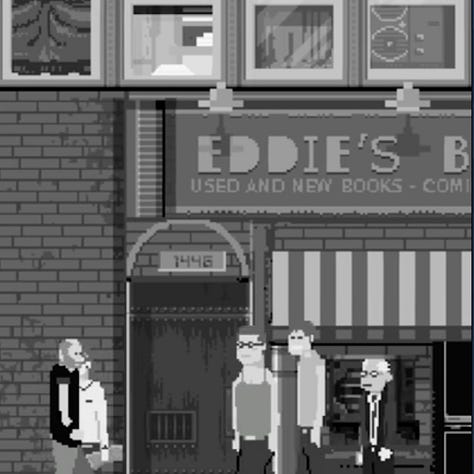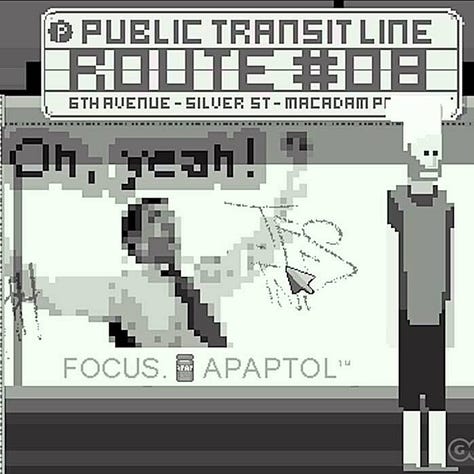You’re Always Going to Lose at Something
Not everything you do will be a smashing success. Life does not always match reward to effort.
Today let’s talk about winning and losing, by way of one of the most unusual video games ever made. 🕹️
This indie game, Cart Life, offers the chance for players to operate a small shop as a street vendor. Lots of simulation-style games allow you to start restaurants, build cities, or oversee empires, but the pressures you experience in Cart Life are unique.
Instead of becoming a mayor or warlord, your character struggles to get by while selling newspapers and coffee.
Here’s how it’s described:
Cart Life is a “retail simulator” about three everyday people trying to make it as street vendors: a Ukrainian immigrant recently arrived in the US, a divorced mother trying to maintain custody of her daughter, and a dreamer who never quite manages to make ends meet.
Cart Life was first released in 2010, and featured a funky grayscale design. You can watch a trailer for a newly released version here:
Cart Life is not an easy game. As you attempt to eke out a living, perhaps saving up to invest in more inventory or a slightly larger cart, lots of things can go wrong. You might miss the bus home and have to splurge on a taxi, depleting your hard-earned funds.
Actions have consequences, and sometimes bad things happen that are outside your control.
Deciding how difficult to make a video game is a key element of design and development. Typically, developers want most games to include a sense of surmountable challenge. Players shouldn’t win every boss fight the first time, or it will feel too easy—but it also has to be possible to win, or players will give up in frustration.
The idea is that a player’s actions determine the course of victory or defeat: If you fail at a challenge, try harder next time and you’ll beat it.
At least that’s the general idea of most games. With Cart Life, the idea is: that’s now how life works! It’s not always fair.






Finally, Cart Life has an interesting feature I haven’t seen anywhere else: not only are you unable to save your progress in the game, allowing you the chance to return to it later, you also can’t take a break from it. There’s no “pause” button! If you step away, the game’s actions continue, which usually results in negative consequences due to your lack of attention.
On the one hand, this could be infuriating. No way to save the game? No breaks allowed? But because it’s so extreme—you just play it until you decide to do something else—the unusual game design works. It’s meant to be played in short sessions, and isn’t really beatable in the sense of a normal game.
Richard Hofmeier, the original developer of Cart Life, came to game design from a non-traditional background. Hofmeier worked a string of odd jobs, from fighting fires to working the night shift in a Montana factory. He stayed away from tech circles and took his inspiration elsewhere. The fact that he made his game more as a social experiment and less as a cash grab gave him even more street cred among fans.
The high difficulty level, randomness, and inability to save your game in Cart Life were all intentional choices: “You're always going to lose in some aspect of your life,” Hofmeier told an interviewer from Wired.
Let’s just pause—in a way that isn’t possible in the game itself—and think about that.
“You’re always going to lose in some aspect of your life.”
It’s impossible, in other words, to do everything well. Some things aren’t going to work out. Sometimes, in fact, you will fail.
Could it be that accepting this fact is a key to happiness? Or at least, to some sort of contentment?
Depending on how and where you grew up, you might have been conditioned to believe that you’ll always be a winner. This is a flawed narrative, and one that might actually contribute to you feeling worse when something quite naturally just doesn’t work out.
Real winners lose, sometimes often, and then adjust quickly. (This was a core message of Born for This, a career book I wrote a while back. Winners give up, they change their minds, they try new things. “Winners never quit” is a lie.)
Feeling better, being better—an act that we CAN accomplish, if we set our minds to it—first requires this act of acceptance. Much that happens in life is out of our control. Like the immigrant in Cart Life who hustles all day only to miss the last bus home, life doesn’t always match reward to effort.
Sometimes you win, sometimes you lose. Your choice is how you respond to success or adversity.
P.S. If you enjoy gaming news (I do!), then check out by , a longtime industry journalist who recently went independent and now publishes his own newsletter.




Wow, I love that you can’t hit “pause” on this game.
I learned the hard way that the inner world works like Cart Life. Our subconscious— the world of our “parts”- exists and evolves whether we check in on it or not.
Once you make contact with parts of yourself you didn’t know existed, it’s best to do everything you can to stay in contact with them. Otherwise they’ll feel abandoned and your budding relationship with them will suffer. Even just a quick, “Hey, what’s up?” before bed or five minutes of journaling makes a huge difference. We neglect our Parts’ Life at our peril, just like neglecting Cart Life!
This made me think that we could internalise:
“I’m such a quitter, I never stick at anything”
Or
“I’m so glad I figured out early that that wasn’t a good fit for me. I learned a lot and will take that into the next thing.”